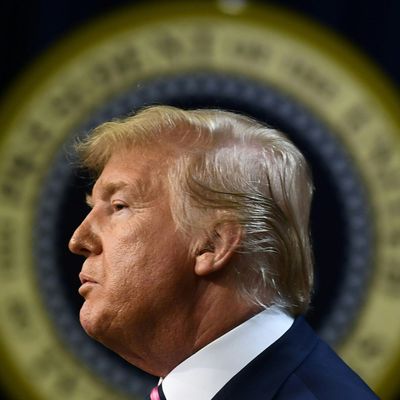
One of the main defenses against impeachment that Republicans constructed on President Trump’s behalf is that he supposedly withheld military aid from Ukraine only because he was concerned about corruption. Trump’s request to investigate the Bidens was “part-and-parcel of his general anti-corruption concern,” suggested Ben Shapiro. Trump “wanted to clean up corruption in Ukraine, and ensure taxpayer-funded aid wasn’t going to corrupt causes,” argues Rep. Mark Meadows.
This defense has numerous flaws. It ignores the sequence of events, in which Zelensky’s anti-corruption reforms preceded the suspension of aid. It ignores Trump’s own words, which repeatedly insisted on investigating the Bidens, and not any other steps toward reform. It ignores the Pentagon’s official process assessing that Ukraine was taking steps against corruption. And it ignores the fact Trump’s “anti-corruption” mission in Ukraine involved hiring crooks to work hand-in-hand with some of the most notoriously corrupt officials in Ukraine.
But the silliest and most insulting aspect of the defense is the idea that Trump actually wants to suppress corruption. Skeptics have noted that he has placed no emphasis on fighting corruption in his foreign relations with any other country, and has indeed pursued closer relations with some of the world’s most corrupt regimes.
Even that skepticism doesn’t go quite far enough, though. Trump actually approves of corruption. A Very Stable Genius, a new book by Washington Post reporters Philip Rucker and Carol Leonig, reports that in 2017, Trump sought to eliminate the Foreign Corrupt Practices Act, which bans U.S. companies from bribing foreign officials. “It’s just so unfair that American companies aren’t allowed to pay bribes to get business overseas,” Trump says, according to the book. “We’re going to change that.”
Asked about this report Friday, White House economic adviser Lawrence Kudlow told reporters “we’re looking at it.” Kudlow, of course, has written that “Wealthy folks have no need to steal or engage in corruption,” so he surely doesn’t see any need to prohibit the rich from engaging in the kinds of untoward practices he is sure they would never need to do.
This was a long-held position by Trump. In 2012, he called the law a “horrible law” that “puts us at a huge disadvantage.” This is not merely a matter of convenience for Trump. His business career has involved working with gangsters and paying off politicians. He believes in his soul that this is how business gets done. Many people are willing to engage in corruption, but Trump’s participation is a matter of conviction. He is not merely corrupt but a corruptionist.
Skeptics have noted Trump’s disinterest in corruption. “Trump has not focused on corruption to any significant degree as president,” argued Philip Bump a couple months ago. But the truth is that Trump has focused on corruption. He wishes there was more of it. It’s astonishing that, even as Trump’s impeachment defense hinges upon his supposed hatred for foreign corruption, his administration isn’t even hiding its desire to weaken the country’s most powerful law against overseas corruption.
This post has been updated.






























